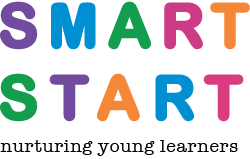This spring, SMART START learned all about amphibians. This science unit thoroughly engaged our young learners' natural curiosity and desire to discover.
Hop along below🐸
The class was introduced to the concept of an amphibian (an animal that lives on land & in water) and the various species. First up were frogs! Students learned the frog lifecycle during a guided group discussion with visuals.
Click this link to view.
A cut and paste worksheet was incorporated to practice identifying each stage: eggs, tadpole, tadpole without gills, tadpole with legs, froglet and adult frog.
Outdoor storytime consisted of a related book to reinforce knowledge on pond life.
SMART START Chefs gathered in their kitchen to create an amphibian's habitat in the form of a fun snack, "Frogs, Worms, Mud & Dirt." This take on the classic, "Worms & Dirt" was concocted using chocolate pudding, gummy frogs, gummy worms and brownie pieces. While enjoying their finished product, peers pretended their treats were live amphibians in their habitats. Educational and delicious!
Salamanders were the second species studied. The group listened intently to a story and acquired some information. Here are a few facts we learned:
- Just like frogs, salamanders lay their eggs in water
- They have colorful spots or stripes and four legs
- A slimy film covers their skin for protection
- Salamanders are the second largest species of amphibians
Pupils circled in their outdoor classroom to learn a key difference between frogs and toads (frogs like to hop and toads prefer to crawl) through a rendition of "Duck, Duck, Goose" called "Frog, Frog, Toad." One child acted as frog by tapping on their friends' heads saying "frog" then eventually selecting someone as "toad." Frog then hopped to a spot in the circle while toad crawled to tag them. Afterwards, classmates continued recreating this game with amphibian inspired names such as "ribbit, ribbit, frog."
SMART START Scientists pondered over themed materials at an indoor display. Books, figurines, flashcards, learning wheels and posters were utilized. This lesson allowed for insightful questions and answers to promote curriculum comprehension.
To conclude this unit, MA Audubon Ipswich River Sanctuary visited our school for a hands-on amphibian program. Miss Maura, the Audubon representative provided a thorough presentation, lead interactive activities and shared her vast expertise. Live salamander eggs, larva and an adult were viewed. Each child had the opportunity to hold the adult salamander! Experiencing subject matter first-hand encourages genuine learning to take place. In addition, Experiential learning ignites a child's innate desire to explore the world around them.
Click Below to View!
We hope you enjoyed reading all about amphibians!
🐸SMART START🐸
















